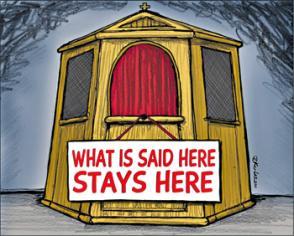Irish Independent
July 18, 2011
http://www.independent.ie/opinion/analysis/mary-kenny-why-the-confessionals-seal-must-remain-sacred-2823875.html
 |
About two years ago, in a university town in the south of England, I sought out the services of a professional counsellor for a troubling family situation.
Before proceedings began, she issued me with a statutory warning. If I had broken the law, had any contact with suspected terrorists or knew of illegal drug-smuggling or other serious offences, she would be obliged to pass this information on to the police.
I was stunned. Beyond the odd speeding ticket, I hadn't broken any law. Yet I didn't like the note struck. I was paying for a confidential service and being told that this professional was, in effect, an agent of the state. I did not, somehow, feel free to speak to her openly.
There is a difference, surely, between a therapeutic counsellor and a court of law.
Whatever happened to the seal of the confessional? Surely that pledge about confidentiality goes well beyond the sacrament of confession itself -- it extends to doctors, lawyers and psychiatrists.
For example, supposing a person comes to his GP with a sexually transmitted disease. Supposing the patient tells the doctor that this must be kept absolutely secret from family, spouse or partner -- although sexually transmitted diseases are contagious and a partner could be at risk. What does the doctor do? Insist on disclosure or keep patient confidentiality?
A GP who I consulted about this hypothetical situation replied that it was a "grey area" of medical ethics. AIDS, HIV, and other sexually transmitted diseases are "social" illnesses with a serious impact on society and on other individuals. Yet if you have a mandatory policy of forcing patients to disclose an STD, then some patients will not come forward for treatment at all.
What doctors try to do is persuade patients to make their condition known to relevant others.
I am not sure if Justice Minister Alan Shatter realises how complex his plan of mandatory reporting of child sex abuse is if revealed in the Catholic confessional.
It has implications for a range of professionals and it could also backfire in the treatment of paedophile offenders.
I discovered this when I interviewed two senior psychiatrists at the Tavistock Clinic in Hampstead, north London, about the treatment of paedophiles. The Tavistock, with its imposing frontal statue of Sigmund Freud, was founded in the 1920s and pioneered enlightened treatment of men suffering from wartime shell-shock. It has also been treating individuals with paedophile tendencies since the 1930s.
Being a paedophile is a dreadful affliction, and individuals with the orientation do indeed voluntarily seek treatment.
However, Tavistock psychiatrists told me that the more "public hysteria" (their words) existing around paedophilia, the more difficult it was for paedophiles to get that treatment.
The campaign by the 'News of the World' to establish "Sarah's Law" -- publicly identifying paedophiles in a neighbourhood -- had made it measurably more problematic to treat the perversion.
Paedophiles were terrified they would be discovered by a lynch-mob -- and professional therapists were equally nervous they, too, might be targeted.
In Portsmouth, England, an angry crowd had attacked a paediatrician in the mistaken belief that a doctor specialising in children's conditions had some link with paedophilia.
The Tavistock psychiatrists were also unhappy about reporting a patient's problems to the police. Again, it deterred potential child abusers from coming forward for treatment.
I subsequently encountered a paedophile who really wanted to recover from this ghastly urge, but he was terrified of seeking professional help, lest it involved the police and then, maybe, an angry mob at his mother's home.
He was being secretly sheltered, as it happened, by a Baptist minister and his wife, who believed it was their Christian duty to try and assist this man to heal his tormenting perversion.
And so we come to the seal of the confessional, which has long been a traditional realm of absolute confidentiality.
Alfred Hitchcock made a famous movie about the subject, 'I Confess', with a compelling Montgomery Clift as a Canadian priest who knew the truth about a murderer's story, but was prepared to go to the gallows himself rather than break the seal of the confessional.
The purpose of confessional confidentiality is that a sinner could confess any sin, however heinous, with complete trust. The confessional -- like the psychiatrist's consulting room -- was not a court of law.
You might be encouraged to go to the law -- but that would be for your own conscience to decide.
If paedophiles abuse a child, certainly they have broken the law and should be charged.
Yet, individuals with a paedophile orientation also need treatment.
If the full weight of the law is invoked if an individual confesses -- to priest or psychiatrist -- that he is troubled by this tendency, then treatment will be deterred.
Forcing a priest to disclose what has occurred in the confessional is also a dangerous step for a free society.
It dents trust. It all but abolishes private conversations. It makes every professional an agent of the State, and there is a word for a society in which everyone is a potential agent of the State: fascism.
Any original material on these pages is copyright © BishopAccountability.org 2004. Reproduce freely with attribution.